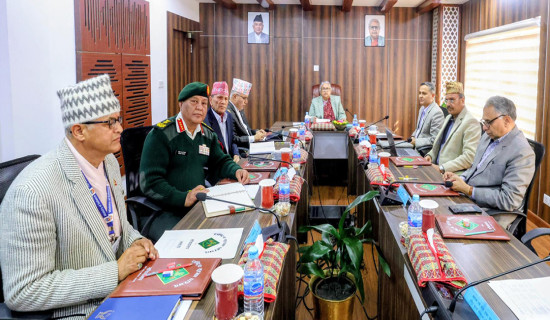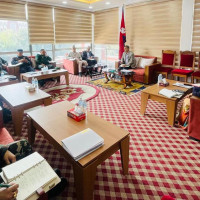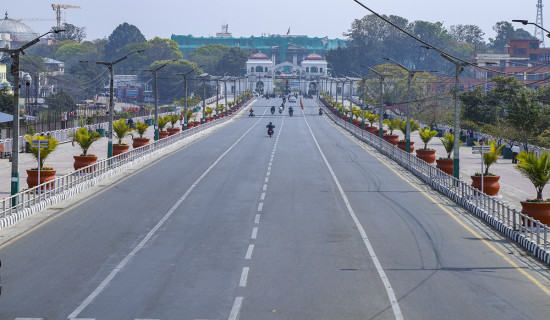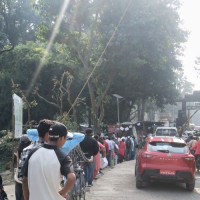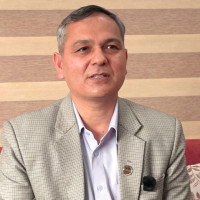- Thursday, 5 March 2026
Dialogue Key To Avert Global Collisions
World politics shows more negative than positive trends. The conflict between India and Pakistan has been shelved. Kurds and Turkey have agreed on disarmament. But Turkey loathes Israel’s regional dominance and the end of the power balance in the region, even if the US has suggested that Syria and Libya normalise ties with Israel. Saudis and Iran have restored their diplomatic relations with the Chinese mediation. The peace accord between Congo and Rwanda enabled President Donald J Trump to peddle himself as a peacemaker but political realists believe that peace can enable America to reap critical minerals.
The entire African continent seethes with the decolonisation of its economy for the African way of life. China has shown eagerness to mediate the border conflict between Thailand and Cambodia. Armenia and Azerbaijan's negotiations, however, ended in a standoff. The nations of the South Caucasus have fought a series of wars in the past when Nagorno-Karabakh, a region in Azerbaijan which is dominated by ethnic Armenian people, broke away from Azerbaijan with Armenia’s help. The Gaza ceasefire between Israel and Hamas saw renewed clashes. Eight years after the signing of Colombia’s peace accords, critical challenges are affecting their execution.
High-stakes geopolitics
The Israel-Iran and Russia-Ukraine conflicts are tangled in high-stakes geopolitics. Germany, the UK and France want to talk to Iran to avert the collision course. Russia wants Ukraine to yield while the latter wishes its sovereignty, territorial integrity and freedom of choice to join NATO. The US and NATO are bolstering their fighting capacity while China hates to see Russia’s defeat. President Trump’s threat to bomb Moscow and impose extra sanctions if it does not stop the war in Ukraine is met with the Russian deployment of nuclear warheads on its borders. NATO has warned Russia to stay away from China’s alliance and avoid challenging the West together. China has warned European nations to remain cautious and stay out of the Ukraine conflict.
This has left the US with deterrent deficits in the Indo-Pacific. It is pressuring India to join the frontline against China. Unlike the US, the EU has defined Israel’s role in Gaza as a matter of human rights and favoured a two-state formula. The nations of the Global South are moving closer to China and Russia as they import oil, gas and weapons and embrace AI, trade, connectivity and infrastructure progress. China says if Israel attacks Iran and Pakistan, it will face full resistance as both are its trusted allies but uses the “dragon-elephant dance” metaphor with India.
Almost all BRICS nations, except India, want to flag American economic dominance, ditch the dollar and evolve a new international system. Thirteen African nations, including South Africa have forsaken American economic and military cooperation for offering natural resources and favouring China. Skirting of collision course in world politics requires reflection on the following areas:
Accountability builds the wisdom of statesmanship: The US leadership faces the trust deficits of its allies and competitors. Global leadership requires acceptability, accountability, humanitarian roles and rule-adherence. President Trump has a vision to make America great again. But his unilateral imposition of tariffs worldwide, renunciation from taking responsibility for the implementation of the Paris climate change, withdrawal from the WHO, UNESCO, Human Rights Council and funding ban on the UN Agency for Palestine Refugees and declining interest in a common security regime have alienated allies. The US has reduced its financial contribution to the WTO and contravened the liberal trade regime. Distrust of its leadership, China, EU, Japan, Canada, India, Brazil and even Australia are either diversifying or building their own capacity independent of the US.
Statesmanship requires contribution, not escaping to unilateralism, protectionism and self-isolation. The world of multi-polarity requires shared leadership, not hegemony. China has committed to giving $500 million to the WHO and 200 million vaccine doses to developing nations. It is implementing about 800 emergency humanitarian projects, including food aid in 40 nations, thus filling the vacuum left by the US.
Curbing the third nuclear age: In the future, more and more nations will race for nuclear capabilities, more deadly than the past nuclear stockpiles, capable of operating at land, sea and space. The nuclear states will support their proxies to acquire nuclear capability. The tendency to use nuclear weapons might grow if national security and survival are at stake. In the new collision between Russia and NATO and Israel and Iran, scenarios are built on the possible use of nuclear weapons. Israel is not a member of the Nuclear Non-Proliferation Treaty, while Iran also criticises the UN nuclear watchdog for its biased reporting and wants the UN to make the US and Israel accountable for hitting its nuclear sites.
The US is engaged in producing Golden Dome as a space shield while India, China, Russia, France, North Korea and the UK are also upscaling their weapon capabilities, fighter planes, drones and missiles and AI-regulated machines. China has recently invented a silent super-weapon. It does not blow up edifices but black out nations in minutes. The duration of the new Strategic Arms Limitation Talks expires next year. Saudi Arabia and South Korea are debating going nuclear — the former because of Iran’s ambition and the latter owing to the fear of North Korea. President Trump asked South Korea, Japan and Australia as to whether they would support the US attack on Beijing in case it reclaims Taiwan. Australia refused, while Chinese President Xi Jinping said, “No force on Earth can prevent China from reclaiming Taiwan.”
Russia, however, criticised the security alliance of the US, Japan and South Korea for plotting against North Korea. The South Korean President Kim Min-sook favours reconciliation with North Korea. Israel, in contrast, is leveraging Indian and American support to weaken China, Pakistan and Iran. India has refused to criticise the US-Israeli attack on Iranian nuclear sites, though Iran and India are members of BRICS and SCO and have an interest in the Chabahar port.
Improving the condition of development: The geopolitical competition among great powers, polarised development, trade rivalry and deviation from rule-based order have increased costs for development. The closure of USAID has affected many developing nations in matters of education, health, production and trade, administrative modernisation, public security and infrastructure development. As a result of the decline of US aid and G7 nations scaling up their own defense expenditure owing to debt and trade deficits, the UN is facing a funding crunch in implementing its SDGs, humanitarian obligations and peacebuilding activities.
BRICS has created its own development fund and New Development Bank to finance development, while the UN Capital Development Fund and EU Development Fund are strained by shifting priorities. Small nations aim to secure investments, court for partner diversification and shape a strategic milieu to leverage their resources and location for shared development and a common approach to mitigate climate change.
Making the Sea and space race a common heritage: Trade through the sea is the cheapest. So far, the US as a sea power has a monopoly. It sought to control sea routes and even restricted its rivals. The US policy to come back to the Philippines, mobilise its Indo-Pacific allies, QUAD and AUKUS and create an arc of security in the islands of the South China Sea and the Indian Ocean is aimed at containing China. The Red Sea is emerging as a geopolitical hotspot as Iran and its supporters sank two Israeli ships and Yemen delivered a massive blow to Israel, penetrating its THAD and Iron Dome and mobilizing people to conscript Houthi rebels.
China is constructing high-speed railway projects in 40 nations of Asia, Africa and Europe to ensure the flow of strategic commodities. China and Brazil have unveiled a grand trans-oceanic corridor plan to link the Atlantic with the Pacific to ease the movement of their cargo ships, bypassing the Panama Canal. It has merged its two shipbuilding companies to become the largest shipbuilder in the world. Sensing fear of China's growing sea trade and influence through the modernisation of about 80 ports of the world, the US, Australia and Japan have signed a trilateral naval logistics agreement.
Australian and the US naval forces support missile reloading for each other’s warships in the Indo-Pacific region. The world witnesses the maneuvering of massive war planes on the horizon, hypersonic jets, deadly missiles and powerful drones moving through the sky, roaring in the stratosphere with crashing accuracy and threatening the possibility of great wars. The tendency to militarize space in a scramble for resources and supremacy is imposing ethical and legal challenges, emerging in the competition for the control of the geopolitics of space.
Global governance
Strengthening the institutions of global governance: President Trump’s peace plans, though, do not sound peaceful, and have a game-changing shift. The loss of American invincibility and self-isolation has created a power vacuum that is filled by the rising powers. The possible solution to global problems lies in strengthening the institutions of the UN, WTO and new international regimes based on the UN ethos. The possible conflict de-escalation strategy in world politics requires searching for opportunities in peaceful options such as dialogue between the Global North and the Global South based not on status but on equality.
This seeks to create institutions of governance and compliance with international laws, scope for diplomatic bargaining, economic sanction measures against the free-riders, crisis-moderation strategy, intra-state balance of power, deterrence and reciprocity for peaceful cooperation. So long as the UN and institutions of global governance remain weak, nations should begin networking, communication and problem-solving exercises and mobilise scientists, public intellectuals, youths, civil society and business as they have a greater stake in the peaceful future.
(Former Reader at the Department of Political Science, TU, Dahal writes on political and social issues.)



